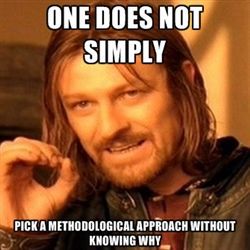The sad state of economics education Nowadays there is almost no place whatsoever in economics education for courses in the history of economic thought and economic methodology. This deeply worrying. A science that doesn’t self-reflect and ask important methodological and science-theoretical questions about the own activity, is a science in dire straits. How did we end up in this sad state? Philip Mirowski gives the following answer: After a brief flirtation in the 1960s and 1970s, the grandees of the economics profession took it upon themselves to express openly their disdain and revulsion for the types of self-reflection practiced by ‘methodologists’ and historians of economics, and to go out of their way to prevent those so inclined from occupying any tenured foothold in reputable economics departments. It was perhaps no coincidence that history and philosophy were the areas where one found the greatest concentrations of skeptics concerning the shape and substance of the post-war American economic orthodoxy. High-ranking economics journals, such as the American Economic Review, the Quarterly Journal of Economics and the Journal of Political Economy, declared that they would cease publication of any articles whatsoever in the area, after a prior history of acceptance.
Topics:
Lars Pålsson Syll considers the following as important: Economics
This could be interesting, too:
Lars Pålsson Syll writes Schuldenbremse bye bye
Lars Pålsson Syll writes What’s wrong with economics — a primer
Lars Pålsson Syll writes Krigskeynesianismens återkomst
Lars Pålsson Syll writes Finding Eigenvalues and Eigenvectors (student stuff)
The sad state of economics education
 Nowadays there is almost no place whatsoever in economics education for courses in the history of economic thought and economic methodology.
Nowadays there is almost no place whatsoever in economics education for courses in the history of economic thought and economic methodology.
This deeply worrying.
A science that doesn’t self-reflect and ask important methodological and science-theoretical questions about the own activity, is a science in dire straits.
How did we end up in this sad state?
Philip Mirowski gives the following answer:
After a brief flirtation in the 1960s and 1970s, the grandees of the economics profession took it upon themselves to express openly their disdain and revulsion for the types of self-reflection practiced by ‘methodologists’ and historians of economics, and to go out of their way to prevent those so inclined from occupying any tenured foothold in reputable economics departments. It was perhaps no coincidence that history and philosophy were the areas where one found the greatest concentrations of skeptics concerning the shape and substance of the post-war American economic orthodoxy. High-ranking economics journals, such as the American Economic Review, the Quarterly Journal of Economics and the Journal of Political Economy, declared that they would cease publication of any articles whatsoever in the area, after a prior history of acceptance.
Once this policy was put in place, and then algorithmic journal rankings were used to deny hiring and promotion at the commanding heights of economics to those with methodological leanings. Consequently, the grey- beards summarily expelled both philosophy and history from the graduate economics curriculum; and then, they chased it out of the undergraduate curriculum as well. This latter exile was the bitterest, if only because many undergraduates often want to ask why the profession believes what it does, and hear others debate the answers, since their own allegiances are still in the process of being formed. The rationale tendered to repress this demand was that the students needed still more mathematics preparation, more statistics and more tutelage in ‘theory’, which meant in practice a boot camp regimen consisting of endless working of problem sets, problem sets and more problem sets, until the poor tyros were so dizzy they did not have the spunk left to interrogate the masses of journal articles they had struggled to absorb.
